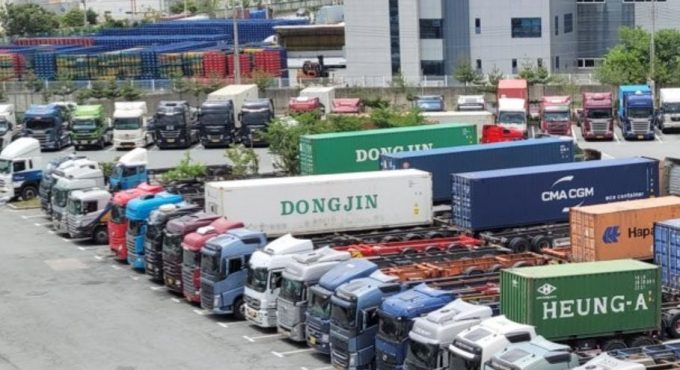Liners add capacity to Asia-ECSA as ocean rates hit 18-month high
With Asia-South America ocean freight rates at an 18-month high of around $4,350 per 40ft, ...

Police in Busan, home to South Korea’s main container port, have begun escorting truckers through picket lines manned by their striking colleagues.
Police set up a special hotline for truckers delivering essentials to call for help if they are being prevented from doing their jobs, and at least 50 HGVs have been escorted through.
The industrial action began on Thursday and yesterday’s first round of negotiations, between the Cargo Solidarity Truckers Union and government officials, failed to reach a compromise.
They will hold more talks tomorrow, but the situation has been compounded by a concurrent strike by railway and subway workers affiliated to the Korean Confederation of Trade Unions, of which the Cargo Solidarity Truckers Union is also a member.
Meanwhile, shipping lines are taking a wait-and-see approach to the truckers’ strike, but none intends to skip calls to Busan and other important container ports in the country.
A representative of Sinokor Merchant Marine told The Loadstar: “As long as the ports are allowing ships in, we don’t see a reason to skip. So far, there haven’t been any problems moving containers on and off the ships. Hopefully, the strike will end soon, because it’s the landside logistics that are affected.”
A spokesperson for HMM, South Korea’s flagship carrier, added: “Export cargo is being brought into the terminals seven to ten days before a ship’s arrival to mitigate the impact of the strike. However, setbacks in the logistics flow are expected if we see prolonged industrial action.”
The truckers want the Safe Trucking Freight Rates System, which guarantees minimum wages, to be permanent after expiring at the end of 2025. The system, introduced by former President Moon Jae-in during Covid, in 2020, was supposed to have expired at the end of this year, but was extended after an eight-day protest strike in June.
Key South Korean ports estimate daily container traffic has plunged to 17% of usual daily levels, with just over 6,000 teu passing through in the past 24 hours. And the Korea International Trade Association, which represents shippers, said since the strike began, it had received 62 complaints from 37 companies.
Some 47% of the complaints relate to penalties resulting from late deliveries. Seventeen were about increased logistics costs, while 14 focused on cases of interrupted production due to disrupted imports of raw and semi-finished materials.
One complainant, a hay importer, said it was impossible to truck goods to customers and had had to pay nearly $151 per container to store them in a warehouse, plus another $300 a day to keep other goods in a container yard at one of the ports.
President Yoon Suk-yeol today issued an executive order compelling cement-mixer drivers to resume work, as the failure to deliver cement to building sites had halted construction activities across the country.
Failure to obey the order, last issued in 2004, could result in imprisonment of up to three years, a maximum $22,500 fine and errant truckers could have their licences suspended for up to six months.
Comment on this article